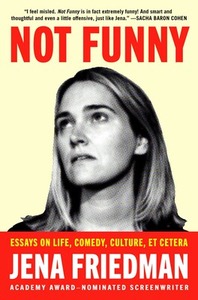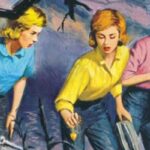
Jena Friedman Gives Male Comedians the Female Media Treatment
“Do you think men can be sexy AND funny?”
If I had a dollar for every time a journalist asked me, “Is it hard being a woman in comedy?” I’d probably make as much as a man in comedy.
The truth is, being a woman in comedy is fine, and sometimes it’s really great. I have nothing to compare it to. It comes with the same indignities as being a woman in almost every other industry in America, but at least we have a microphone!
There is, however, one aspect of the job that’s pretty annoying: constantly fielding inane, distracting, and sexist questions during press interviews. If only we could all just do our work and answer questions about that, but no. So often, female comics have to answer questions about anything else: from sexism in society to our male coworkers’ sexual misconduct allegations. It makes me wonder if male comedians ever get similar questions from journalists, and if so, how do they respond when asked them?
Inspired by all the batshit-crazy but completely real questions that I and other female comedians have endured over the years from legitimate journalists (including notable ones from publications such as the Guardian, the New Yorker, and the New York Times), I asked my favorite male comedians the most sexist (but 100 percent real) questions that I could find, mostly verbatim, just with the genders reversed.
The results were illuminating.
A little note on my methodology: For all my interviews, I reached out to my favorite male comedian friends and mentors. I prefaced my intent in advance (something I rarely do before interviews). Each interview was done individually, via phone or email, but everyone got similar questions. Some responses are verbatim, while others are condensed for clarity.
*
What’s it like to be a man in comedy?
JON STEWART: [laughs] It’s golden. Basically, men in comedy are carried into the clubs. It’s incredibly pampering, you’re paid in Dogecoin—did I even say that right? Dogecoin and cocaine futures.
EUGENE MIRMAN: Um, you know, it feels fine. It feels like I have opportunities I can pursue [laughs]—I’m sorry you get that question. It’s so outside of what I do that it really makes it clear that interviews for you are probably unpleasant.
JENA FRIEDMAN: This is just the first one!
BOB ODENKIRK: Uh … perfectly uninteresting, un-unique. It’s, uh … what’s it like being a man in comedy? I fit right in [laughs].
JENA FRIEDMAN: You’re doing great. It doesn’t have to be funny—
BOB ODENKIRK: I’m allowed to be a crude asshole and get laughs from it and let that part of my psyche out in a public way for the sake of laughter.
PATTON OSWALT: Sometimes the road can be a little rough.
I don’t want to make it sound like some horror movie, but sometimes club owners are more concerned with drink sales and not focused on, say, crowd control. And then there’s that double-edged sword of, “I could use a little support here,” but then you’re ALSO like, “Men can take care of themselves.” There’s still a long way to go, but it’s fun.
JIM GAFFIGAN: Well, I can’t really speak for my entire gender.
REGGIE WATTS: [really long pause]
JENA FRIEDMAN: Reggie?
REGGIE WATTS: Yes.
JENA FRIEDMAN: Is it hard to be a man in comedy?
REGGIE WATTS: It is, because you constantly have to watch your back, you have to make sure what people are laughing at are your jokes and not just your nice hips.
*
When did you decide to become a male comedian?
EUGENE MIRMAN: [laughing] I can’t handle that, uh, that it’s, that—anyway, I guess when I was 18 I decided to be a male comedian. Or at seventeen I think I realized that comedy was the kind of job and I was male and so that’s what happened.
JIM GAFFIGAN: Well, I didn’t decide to become male. I was born male.
BOB ODENKIRK: I’ve always been male … and I … just … WHAT?! [laughing] I always wanted to be a comedian since I … I just did … that is what I did. Yeah, uh … yeah … Since I was a kid. I always just … [long pause] I didn’t think I had a choice to become a female comedian, so … it was a different time, I didn’t have that option [laughing].
REGGIE WATTS: Uh, I was a little nervous about it at first because there’s not a lot of precedent for male comedians. Age sixteen was when I started, but I probably did it for realsies when I was 30 years old.
FRED ARMISEN: [laughs] I think I was around 32.
It wasn’t that much of a decision. I just started doing comedy more and more.
JON STEWART: [laughs] Um, you know for years I was a boy comedian, and I think it was at some point after my bar mitzvah that I decided—actually, I don’t think I decided, I think it was just pronounced and anointed. It was at a ceremony—[beep] HOLY FUCK … Could you hear that?
JENA FRIEDMAN: No, what?
JON STEWART: [is driving a car during the interview] You didn’t hear that? All of a sudden an Amber Alert went off on my phone and made a shrieking noise—apparently there is a gentleman in a silver car in East Orange who is considered armed and dangerous and I have apparently been deputized to go get him.
JENA FRIEDMAN: Are you gonna end this interview so you can find a missing child? That would be the best PR move… .
JON STEWART: Here’s how important this interview is for me: you’re just gonna go on a ride-along. I’m not going to end it, you’re just going to experience Cops, Stew style. I can’t believe you didn’t hear that.
JENA FRIEDMAN: I love the idea that there’s a B story to this interview [laughing].
*
Was it hard to be a male comedian back when you were starting out?
JON STEWART: [laughs] It’s so interesting that they view it as a subspecies. Now to [journalists’] somewhat credit, it was actually much harder to be a female comedian when I started. It really was all men. There was Joy Behar, Susie Essman, there were some young comics, Laura Kightlinger, Janeane Garofalo, but they were sort of on the vanguard. But if you went to the Comedy Cellar on a Friday or Saturday night, it was mostly 100 percent male or 90 percent—
JENA FRIEDMAN: So to circle back to my question, was it harder to be a male comedian?
Before men were allowed in comedy clubs, it was only men.–Jon Stewart
JON STEWART: [laughs] Right. Yes! Because the competition was fierce! There was only every slot, so you had to fight for all of them.
FRED ARMISEN: It wasn’t that hard. I just didn’t have many expectations. You know, even if I performed to not many people, it was fun for me anyway.
*
Do you think it has changed for men since you got into the business?
EUGENE MIRMAN: Yeah.
JENA FRIEDMAN: In what ways?
EUGENE MIRMAN: YouTube.
REGGIE WATTS: I think men have more to worry about, and that’s a good thing. It’s nice to see advancements like that, in my lifetime.
FRED ARMISEN: I think everything has changed for everybody. Time just does that. But it’s a good thing, things changing.
PATTON OSWALT: I think people are coming in with less expectations—they’re not assuming you’re going to talk about tools or cars or home repairs. Men go shopping, too!
JON STEWART: Definitely it has changed for us, when we finally broke through and were allowed in every comedy club … before men were allowed in comedy clubs, it was only men.
JIM GAFFIGAN: I don’t understand where that question is coming from.
*
Do you think men can be attractive and funny?
EUGENE MIRMAN: Probably.
FRED ARMISEN: That’s actually a good question, not that the other ones weren’t good questions [laughs]. Yes, I do … Bob Odenkirk, he’s attractive … I mean, Charlie Chaplin was attractive—
JENA FRIEDMAN: [laughs] Everyone’s attractive to you.
JIM GAFFIGAN: I think they are two separate things, which really have nothing to do with one another. Funny is the only important thing in stand-up. Well, it should be, in my opinion.
JON STEWART: I have not seen it. I think if they were attractive, they wouldn’t need to be funny.
*
Do you think men can be sexy and funny?
PATTON OSWALT: I’m not gonna lie and say that a nice shoulder-to-hips ratio doesn’t open some doors, but after that, you’d better be able to deliver the material. You’d better be funny. I know a lot of male comedians who were VERY handsome and figured they could coast on that, but then Pepitone is suddenly getting all the TV gigs. It’s a wake-up call once you hit that stage.
BOB ODENKIRK: Actually, no. I don’t think comedians can be sexy. I suppose there might be a few who are, only to fetish freaks. I think part of being a comedian is being an underdog … not being cool, or sexy … I’ve always thought you can’t have both, to be funny, you have to be making fun of convention. Beauty and sexiness is very often fitting an ideal.
JENA FRIEDMAN: These are all questions female comics have been asked, so if any are off-putting, I’m sorry.
BOB ODENKIRK: Tough shit is what you’re saying [laughs].
*
Do you think it’s more difficult for male comics who are not attractive?
JIM GAFFIGAN: Wait, are you saying I’m not …
JON STEWART: [laughs] Yes. It is very, very difficult. That’s why we are out at night. I’m pretty sure that’s why there’s a two-drink minimum, it’s not to loosen people up for the funny, it’s to make us palatable to the eye.
REGGIE WATTS: It is, 100 percent. I have a lot of male friends who are not attractive, and they have lost out on many gigs, even open mics.
JENA FRIEDMAN: Are you being serious?
REGGIE WATTS: No, [laughs] no, I’m not.
FRED ARMISEN: I think for male comics who are not attractive, they’ll find their place. And sometimes, they’ll even make jokes about it … and by “they,” I’m not implying that I think I’m attractive—[laughs]
I guess it’s a compliment when people tell me, “You could totally hang with the lady comics!”–Patton Oswalt
JENA FRIEDMAN: [laughs] You’re clearly on your toes by this line of questioning. Which is all I am really trying to achieve—
FRED ARMISEN: These are great.
JENA FRIEDMAN: They’re all real questions.
FRED ARMISEN: God.
*
Is it harder to date since you’ve started doing stand-up?
REGGIE WATTS: It is, because women are very intimidated.
JIM GAFFIGAN: Stand-up is a strange life, so it makes traditional or “normal” dating virtually impossible.
FRED ARMISEN: [laughs] Oh my god.
JENA FRIEDMAN: What’s the “oh my god” about?
FRED ARMISEN: Is it hard to date?! Um, is it hard to date, since I’ve started doing stand-up? It’s the same.
BOB ODENKIRK: [pauses, then laughs loudly] Well, I’ve been married for 24 years, so, uh—
JON STEWART: I’m stunned. Are these real questions?
JENA FRIEDMAN: Yes.
JON STEWART: [laughs] It was the only way I could date, sadly I love that their concern for a female comic is, “You went into comedy, are you prepared to die alone?”
JENA FRIEDMAN: It’s a real concern!
JON STEWART: [driving] By the way, I just let someone go even though I had the right of way, and I don’t know if you can capture that type of altruism [in the interview]… .
JENA FRIEDMAN: For sure!
JON STEWART: And I’m not even sure I got a wave on it, but that’s fine.
*
Do you write your own material?
FRED ARMISEN: [pause] Yes!
PATTON OSWALT: I really do! I guess it’s a compliment when people tell me, “You could totally hang with the lady comics!”
REGGIE WATTS: [laughs] Oh my god. Uh. Yes. Most of it. Actually, it writes itself.
JENA FRIEDMAN: Why did that make you laugh?
REGGIE WATTS: It’s just like the most, like, I guess backhanded. It’s just so, come on, man, Jesus Christ. “Well, we gotta prove women are just as funny as guys are, so just to be sure, do you write your own material? We’re hoping it’s yes.” I mean, what the fuck, come on!
JIM GAFFIGAN: Yes. Well, occasionally I write with my wife.
JON STEWART: [laughs] I have a team, almost like a construction crew.
EUGENE MIRMAN: Um. Sorry, another call was coming in. I wasn’t stumped by the question [laughs]. The real answer is: yes. I’m trying to think of a joke answer—
JENA FRIEDMAN: This is the one question people get the most offended by.
EUGENE MIRMAN: Oh, I’m not offended!
JENA FRIEDMAN: Oh, I know, I know! [laughs]
EUGENE MIRMAN: I just wanted to be like “a penguin writes my material,” but I wanted it to be a better thing than that [laughs]. I’ll say that I write my own material, but in a week I might email you with a better joke.
JENA FRIEDMAN: You can totally do that!
EUGENE MIRMAN: Right, right.
JENA FRIEDMAN: I just wanna make you guys feel safe, not like how I was when I was asked these questions.
EUGENE MIRMAN: [laughs] When you did all these interviews that are on record. Yes, I think the correct answer is I write my own material.
BOB ODENKIRK: [pause] YES! No one else is to blame for how bad my material is, just me.
JENA FRIEDMAN: Have you ever been asked that?
BOB ODENKIRK: No, never been asked that. It’s ridiculous. Nobody should be asked that after 1972.
*
Is all your material about being a dad?
JIM GAFFIGAN: No.
JON STEWART: That’s a tough one, because you could see that not being viewed through the lens of pure sexism but somebody who actually knew the act and could be like, “Are you just having children to get another 15 minutes?”
JENA FRIEDMAN: [laughing] I feel bad for whoever I asked that question to via email and not via phone call, like Jim Gaffigan, because his interview was via email and I think I offended him!
JON STEWART: Aw, man, that’s funny.
BOB ODENKIRK: [laughing] No, just very little of it.
EUGENE MIRMAN: Um, if I hope to take my comedy to the next level, I will stop doing stand-up about weird things that have happened to me and I will switch mostly to fatherhood. My comedy is a mix of what happens to me, which now incorporates fatherhood.
FRED ARMISEN: None of my material is about being a dad. I’m not a dad.
JENA FRIEDMAN: I’m sorry, I just assumed since you’re a man that you’re a dad.
FRED ARMISEN: No.
__________________________________

Copyright © 2023 by Jena Friedman. From the forthcoming book NOT FUNNY by Jena Friedman, to be published by One Signal Publishers/Atria Books, a Division of Simon & Schuster, Inc. Printed by permission.
Jena Friedman
Jena Friedman is a comedian, filmmaker, and creator of AMC’s Indefensible and Soft Focus with Jena Friedman on Adult Swim. She has worked on The Daily Show with Jon Stewart, Late Show with David Letterman, and her writing has appeared in The New Yorker, ARTNET, and The Guardian. She was nominated for an Academy Award for Best Adapted Screenplay, and won a Writer’s Guild of America award for her work on Borat Subsequent Moviefilm. She splits her time between Los Angeles and New York. Find out more at JenaFriedman.com and follow her on Twitter @JenaFriedman.



















